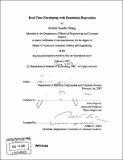Real-time enveloping with rotational regression
Author(s)
Wang, Robert Yuanbo
DownloadFull printable version (10.37Mb)
Other Contributors
Massachusetts Institute of Technology. Dept. of Electrical Engineering and Computer Science.
Advisor
Jovan Popovic.
Terms of use
Metadata
Show full item recordAbstract
Enveloping (or skinning) is the process that relates a skeleton, which an animator controls, to a 3-D surface mesh, which the audience sees. This process is necessary in most computer graphics applications that involve animated characters. The complexity (and speed) of enveloping solutions vary from photo-realistic muscle simulations used for movie production, to artifact-ridden heuristics such as linear blend skinning used for video games and training simulations. We propose a method for example-based enveloping of 3-D characters. We can approximate the output of muscle simulations or other high-quality enveloping tools with a model that can be evaluated at speeds comparable to the fastest enveloping techniques. Our technique introduces a rotational regression model that can accurately capture common skinning behaviors such as muscle bulging, twisting, and challenging areas such as the shoulders. Our better treatment of rotational quantities is made possible by a framework that predicts mesh deformation gradients instead of mesh vertex positions. We reconstruct the vertex positions from deformation gradients in an additional step by solving a Poisson equation. We show that our model is significantly more expressive than linear blend skinning and capable of capturing a wider variety of effects without generalization problems. Our method is also comparable in run-time speed to linear blend skinning. All in all, we are proposing a more general, less artifact-ridden, replacement for linear blend skinning that will allow for more realistic enveloping in real-time applications.
Description
Thesis (S.M.)--Massachusetts Institute of Technology, Dept. of Electrical Engineering and Computer Science, 2007. Includes bibliographical references (p. 49-52).
Date issued
2007Department
Massachusetts Institute of Technology. Department of Electrical Engineering and Computer SciencePublisher
Massachusetts Institute of Technology
Keywords
Electrical Engineering and Computer Science.